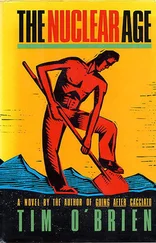A prickly heat pressed against his face. The teakettle made its clicking sound in the night.
Briefly then, he let himself glide away. A ribbon of time went by, which he would not remember, then later he found himself crouched at the side of the bed. He was rocking on his heels, watching Kathy sleep.
Odd, he thought. That numbness inside him. The way his hands had no meaningful connection to his wrists.
For some time he crouched there, admiring the tan at Kathy’s neck and shoulders, the wrinkles at her eyes. In the dim light she seemed to be smiling at something, or half smiling, a thumb curled alongside her nose. It occurred to him that he should wake her. Yes, a kiss, and then confess to the shame he felt: how defeat had bled into his bones and made him crazy with hurt. He should’ve done it. He should’ve told her about the mirrors in his head. He should’ve talked about the special burden of villainy, the ghosts at Thuan Yen, the strain on his dreams. And then later he should’ve slipped under the covers and taken her in his arms and explained how he loved her more than anything, a hard hungry lasting guileless love, and how everything else was trivial and dumb. Just politics, he should’ve said. He should’ve talked about coping and enduring, all the clichés, how it was not the end of the world, how they still had each other and their marriage and their lives to live.
In the days that followed, John Wade would remember all the things he should’ve done.
He touched her shoulder.
Amazing, he thought, what love could do.
In the dark he heard something twitch and flutter, like wings, and then a low, savage buzzing sound. He squeezed the teakettle’s handle. A strange heaviness had come into his arms and wrists. Again, for an indeterminate time, the night seemed to dissolve all around him, and he was somewhere outside himself, awash in despair, watching the mirrors in his head flicker with radical implausibilities. The teakettle and a wooden hoe and a vanishing village and PFC Weatherby and hot white steam.
He would remember smoothing back her hair.
He would remember pulling a blanket to her chin and then returning to the living room, where for a long while he lost track of his whereabouts. All around him was that furious buzzing noise. The unities of time and space had unraveled. There were manifold uncertainties, and in the days and weeks to come, memory would play devilish little tricks on him. The mirrors would warp up; there would be odd folds and creases; clarity would be at a premium.
At one point during the night he stood waist-deep in the lake.
At another point he found himself completely submerged, lungs like stone, an underwater rush in his ears.
And then later, in the starwild dark, he sat quietly at the edge of the dock. He was naked. He was all alone, watching the lake.
Later still, he woke up in bed. A soft pinkish light played against the curtains.
For a few seconds he studied the effects of dawn, the pale ripplings and gleamings. He’d been having a curious nightmare. Electric eels. Boiling red water.
John Wade reached out for Kathy, who wasn’t there, then hugged his pillow and returned to the bottoms.
Maybe it was something simple.
Maybe Kathy woke up scared that night. Maybe she panicked, just walked away.
It’s conjecture—maybe this, maybe that—but conjecture is all we have.
So something simple:
He was yelling bad things in the dark, and she must’ve heard him, and maybe later she smelled the steam and wet soil. Almost certainly, she would’ve slipped out of bed. She would’ve moved down the hallway to the living room and stopped there and watched him empty the teakettle on a geranium and a philodendron and a small young spider plant. “Kill Jesus,” he was saying, which would’ve caused her to back away.
The rest must have been automatic. She would’ve turned and moved to the kitchen door and stepped out into the night.
Why? she thought.
Kill Jesus. That brutal voice. It wasn’t his.
And then for a long while she stood in the windy dark outside the cottage, afraid to move, afraid not to. She was barefoot. She had on a pair of underpants and a flannel nightgown, nothing else.
A good man. So why?
Clutching herself, leaning forward against the cold, Kathy watched him pad into the kitchen, refill the teakettle, put it on the stove to boil. His movements seemed stiff and mechanical. Like a sleepwalker, she thought, and it occurred to her that she should step back inside and shake him awake. Her own husband. And she loved him. Which was the essential truth, all that time together, all the years, and there was nothing to be afraid about.
Except it wasn’t right. He wasn’t right. Filtered through the screen door, his face looked worn and bruised, the skin deeply lined as if a knife had been taken to it. He’d lost weight and hair. His shoulders had the stooped curvature of an old man’s. After a moment he lay down near the stove, sunburnt and naked, conversing with the kitchen ceiling. Not the man she’d known, or thought she’d known. She had loved him extravagantly—the kind of love she’d always wanted—but more and more it was like living with a stranger. Too many mysteries. Too much walled-up history. And now the fury in his face. Even through the screen, she could make out a new darkness in his eyes.
“Well, sure,” he was saying. “Shitfuck Jesus.”
Then he said, “ You! ”
He chuckled at this.
He jerked sideways and clawed at his face with both hands, deep, raking the skin, digging in hard with his fingernails, then laughed again and muttered something indistinct.
A bit later he said, “Beautiful.”
Again, Kathy felt a little gust of panic. She turned and looked up the narrow dirt road. The Rasmussen cottage was barely a mile away, a twenty-minute walk. Find a doctor, maybe; something to settle him down. Then she shook her head. Better just to wait and see.
What she mostly felt now was a kind of pity. Everything important to him had turned to wreckage. His career, his reputation, his self-esteem. More than anyone she’d ever known, John needed the conspicuous display of human love—absolute, unconditional love. Love without limit. Like a hunger, she thought. Some vast emptiness seemed to drive him on, a craving for warmth and reassurance. Politics was just a love thermometer. The polls quantified it, the elections made it official.
Except nothing ever satisfied him. Certainly not public office. And not their marriage, either.
For a time Kathy stood gazing at the night sky. It surprised her to see a nearly full moon, a stack of fast-moving clouds passing northward. She tried to inventory the events unfolding in her stomach. Not only pity. Frustration. The fatigue of defeat. The whole election seemed to have occurred in another century, and now she had only the vaguest memory of those last miserable weeks on the road. All through August and early September, after the newspapers broke things wide open, it was a matter of waiting for the end to come exactly as it had to come. No hope. No pretense of hope. Over the final week they’d worked a string of towns up on the Iron Range, going through the motions, waving at crowds that weren’t crowds anymore. Accusing eyes, perfunctory applause. A freak show. On primary day they’d made the short flight back to Minneapolis, arriving just before dark, and even now, in memory, the whole scene had the feel of a dreary Hollywood script—the steady rain, the threadbare little crowd gathered under umbrellas at the airport. She remembered John moving off to shake hands along a chain fence, his face rigid in the gray drizzle. At one point, as he stepped back, a lone voice rose up from the crowd—a woman’s voice—not loud but extraordinarily pure and clear, like a small well-made bell. “Not true!” the woman cried, and for an instant the planes of John’s face seemed to slacken. He didn’t speak. He didn’t turn or acknowledge her. There was a short quiet before he glanced up at the clouds and smiled. The haggard look in his eyes was gone; a kind of rapture burned there. “Not true!” the woman yelled again, and this time John raised his shoulders, a kind of plea, or maybe an apology, a gesture vague enough to be denied yet emphatic enough to carry secret meaning.
Читать дальше












